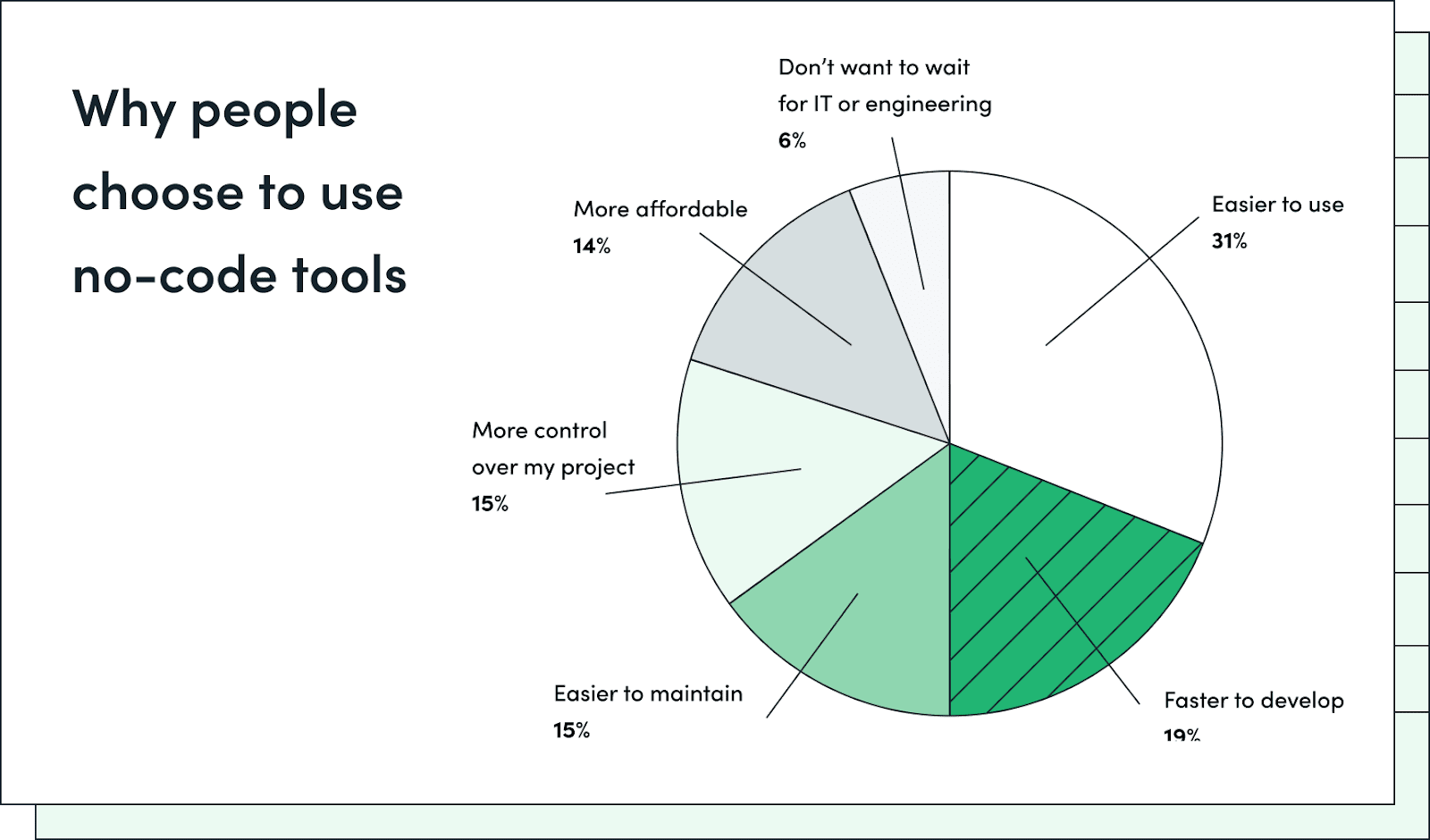Modern businesses run on software, yet there are not enough software developers to go around.
To begin with, only around 1% of the worldwide population knows how to code. Yes, you read that right.
If you want the actual numbers, Developer Nation’s Pulse Report estimated that there were 24.3 million active software developers in the world at the start of 2021. That’s a fairly small number when you compare it to the worldwide population of 7.9 billion people.
And while the percentage of coders is small, the demand is incredibly high: In the first half of 2019, tech job postings in the U.S. rose 32% from a year earlier. And there seems to be no slowing down in sight. According to the CompTIA Tech Jobs Report, tech job postings more than doubled between May 2021 and May 2022.
The cherry on top of this somewhat stressful situation? Software engineering salaries rose by 0.8% to average $156,000 in the U.S. in 2021.
I don’t know about you, but that sounds like a potential hiring crisis to me—and one you probably want to avoid at all costs, considering unfilled vacancies reduce productivity levels by 75%.
So what can your business do to fill this gap? Sahil Khosla shares the answer in his recent episode of Formstack’s Practically Genius podcast. It comes down to two words: citizen developers.

Listen Now: If you’d rather listen than read, catch Sahil’s episode No-Code Is the Future now to learn more about citizen developers and the tools anyone in your organization can use to develop software.
What is a citizen developer?
If you’re not familiar with the term citizen developer, Sahil provides a great definition.
“A citizen developer is a person in an organization who does not have a technical background and is looking to build a solution to solve their own business needs. Typically, they would've gone out to the IT or the engineering team to get it done. But now, they can develop it themselves.”
You might be asking how exactly these citizen developers are able to create solutions without any technical skills or coding abilities. The answer: no-code tools.

No-code is a type of software that allows anyone to create digital applications without writing a single line of code. It involves using tools with an intuitive, drag-and-drop interface to create a unique solution to a problem. The resulting solution can take many forms—from building mobile, voice, or ecommerce apps and websites to automating any number of tasks or processes.
These tools allow non-technical workers, in any department, to create the processes, products, and tools they need to get work done—without needing support from IT. They help organizations become more digitally agile, which makes it easier to edit, change, and adapt workflows with limited investment of time, money, and technical resources.

What are the benefits of using no-code tools?
No-code and low-code tools have contributed to the rise of the citizen developer. Without these tools, non-technical workers would not be able to easily produce apps, websites, and workflows without code.
But why are no-code tools so powerful? Sahil put it best:
Citizen developers use no-code tools for a variety of reasons. As Sahil pointed out, they can act as “LEGO blocks” for users by providing a simple, visual way to build out solutions. But their visual interface is just one of the many reasons people choose to use no-code tools.
According to our No-Code Economy Survey, the top two benefits of no-code tools is that they are easier to use and faster to develop.

Workers can often pick up these tools with little to no training, while coding can sometimes take years to learn. With no-code tools, non-technical users are able to quickly and easily build solutions—from apps to automations—in just hours, versus weeks or months.
Want to inspire citizen developers inside your org? Share these resources with them:
The Rise of the No-Code Economy
The 40 Most Popular No-Code Tools
How No-Code Can Empower You to be a Creator
Can citizen developers replace software developers?
It’s clear that there’s a shortage of software developers and engineers—so can citizen developers replace them? Not exactly, but they sure do help fill the gap. Sahil explained it like this:
“Every company is in some shape or form a tech company. And whether they outsource their tech work or do it in house, you need people who can develop software. The need’s only going to increase.
It's pretty clear that the number of engineers that are trained every year are not enough to meet that demand. It's a no-brainer that making software development accessible to more and more people via these no-code and low-code tools is the way to go to fill that skill gap.”

In short, citizen developers provide organizations a way to take some of the pressure off of their skilled developers and IT teams. Coding will always be required for certain business processes and systems, but it’s not a necessity for everything. Here are a few ways citizen developers can use no-code tools to assist the dev team:
- Provide visual mockups
- Create minimal viable products
- Automate tasks without code or APIs
- Test processes without IT assistance
- Update workflows in real time
- Build digital forms, websites, and apps
Consider citizen developers as an extension of the development team instead of a replacement.
When provided the right resources and autonomy, they can make a huge impact across your organization.
Related: Why Developers and IT Teams Should Use No-Code Tools
Discover the Power of Citizen Developers
It’s not getting any easier to hire software engineers. A limited market, increasing salaries, and high demand make it difficult to get talent in the door. It’s quite the storm to weather, especially with a recession possibly looming ahead.
When your dev team is faced with doing more with less, citizen developers can make all the difference. Providing employees with no-code tools empowers them to build their own solutions, which frees up time for your software engineers and IT team. It’s a win-win!
Want to learn more about how no-code and citizen developers can help your organization succeed? Listen to Sahil’s episode No-Code Is the Future now to learn everything you need to know about adding no-code to your tech stack.











